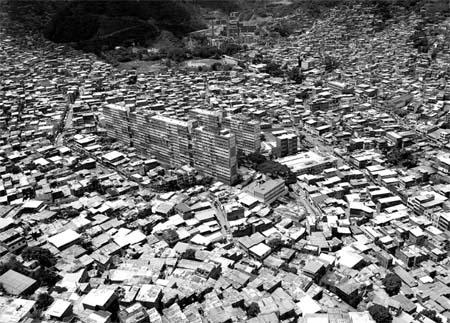Lecture
TSocial In-Habitat, South America/Caracas
Miguel Robles-Duran

ETH Studio Basel
This lecture investigates lessons to be learned from the desires and strategies for appropriation developed by working-class urban inhabitants who, at least for a brief moment, have managed to put up resistance and claim their “right to the city”. The Social In-Habitat program seeks latent possibilities for close collaboration with governments and the general public towards speculative design proposals for the large- and small-scale re-introduction of urban development based on “in-city social housing” that utilize empty urban spaces and aim to regenerate gentrified fabric. Social In-Habitat aims to provoke the necessary levels of confrontation, sharing, and cooperation to inject a notion of a coexisting social difference in the fabric of these metropolises and to stimulate a dialogue with the citizens on the social benefits of avoiding geographical expansion in favor of core urban constructions and precise architectonic solutions.
The subject of in-city social housing has been seldom explored since the great post-war investments in urban construction and design in the South American countries ruled by Social Democratic governments, investments that due to the passage of time, the influence of the US, and the sudden decline of economic and democratic systems, proved unsuccessful in dealing with the massive social upheavals brought forth by such a shift. The design and construction of social housing was not prioritized and was relegated to the bottom of governmental investment priorities, creating a problem that so far is largely viewed only in terms of site and profit maximization, building technologies, serial urban planning, and mass credit strategies. For a little more than three decades, urbanism and architecture have been denied the possibility of political participation in the production of social space and the development of cohabitation strategies that are necessary for the construction of low-cost housing. The primacy of technocratic considerations, corruption, and the private market have limited the urgently needed participation from the disciplines of spatial design. However, a political shift in the majority of countries across the continent has reopened the prospect for the possibility of an open dialogue in developing proposals for optional solutions to what is widely recognized as one of the most urgent problems the region faces, namely the current housing crisis. Against this backdrop, the project relies on the political desire of the citizens and the current governments to collaborate with this program in the development of feasible design solutions to counter the current neoliberal trends in urban development. The program strongly believes that this active collaboration allows architecture to participate politically in the transformation and production of social urban space.
Born in Mexico City, Miguel Robles-Duran studied architecture at the ITESM in Monterrey, Sci-Arc in Los Angeles, and the Berlage Institute in Rotterdam. He is currently conducting research as a PhD candidate on “Contentious Collective Urban Manifestations” at the Berlage Institute. He has taught theory and design at the Universidad Iberoamericana in Tijuana, Mexico, at The New School of Architecture in San Diego, California, and at Woodbury University Los Angeles/San Diego; postgraduate urban design at K.U. Leuven, Belgium; and architecture/urban design at the Berlage Institute. He is currently teaching a Master’s diploma design studio and an advanced theory seminar on Marx, Utopia, and the postmodern city at TU Delft and the Berlage Institute. www.cohabitationstrategies.org
![]() Programme English (pdf)
Programme English (pdf)

